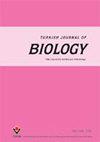Antileukemic potential of Nile blue-mediated photodynamic therapy on HL60 human myeloid leukemia cells
IF 0.9
4区 生物学
Q3 BIOLOGY
引用次数: 0
Abstract
Background/aim Photodynamic therapy (PDT) has received great attention over the past decade in the treatment of diseases such as leukemia which is a cancer of the blood and bone marrow cells that causes a significant number of deaths worldwide. In this study, it was aimed to investigate the effects of Nile blue-mediated PDT (NB-mediated PDT) on HL60 cells. Materials and methods The effect of NB-mediated PDT on cell proliferation was evaluated with cell volume analysis using flow cytometry at 24 h. Cell apoptosis, ROS production, mitochondrial membrane potential, and cell cycle analysis were evaluated using annexin V-FITC, H2DCFDA, JC-1, and PI staining, respectively, by flow cytometry and fluorescence microscopy. The morphological and ultrastructural analyses were examined by Giemsa staining and SEM. CD11b staining is used to determine the differentiation of leukemia cells. Results NB-mediated PDT induced an apoptotic response at 12.5 μM in HL60 cells. When Giemsa staining and SEM images were evaluated, apoptotic bodies, holes, and occasional folds were detected on the surfaces of cells in the NB-mediated PDT group. Conclusion The NB-mediated PDT had no effect on the differentiation of leukemia cells, but this therapy affects the growth of HL60 cells in vitro, which may provide a new idea for removing leukemic cells from bone marrow intended for autologous transplant.尼罗蓝介导的光动力疗法对HL60人髓系白血病细胞的抗白血病潜能
背景/目的:在过去的十年中,光动力疗法(PDT)在治疗白血病等疾病方面受到了极大的关注,白血病是一种血液和骨髓细胞的癌症,在世界范围内导致大量死亡。本研究旨在探讨尼罗蓝介导的PDT (nb介导的PDT)对HL60细胞的影响。材料与方法:24 h流式细胞术检测nb介导的PDT对细胞增殖的影响,流式细胞术检测膜联蛋白V-FITC、H2 DCFDA、JC-1、荧光显微镜检测细胞凋亡、ROS生成、线粒体膜电位、细胞周期分析。采用Giemsa染色和扫描电镜对其进行形态学和超微结构分析。CD11b染色用于检测白血病细胞的分化情况。结果:nb介导的PDT在12.5µM下诱导HL60细胞凋亡。在对吉姆萨染色和扫描电镜图像进行评估时,在nb介导的PDT组细胞表面检测到凋亡小体、孔和偶有褶皱。结论:nb介导的PDT对白血病细胞的分化无影响,但在体外可影响HL60细胞的生长,这可能为骨髓自体移植白血病细胞的清除提供新的思路。
本文章由计算机程序翻译,如有差异,请以英文原文为准。
求助全文
约1分钟内获得全文
求助全文
来源期刊

Turkish Journal of Biology
BIOLOGY-
CiteScore
4.60
自引率
0.00%
发文量
20
审稿时长
6-12 weeks
期刊介绍:
The Turkish Journal of Biology is published electronically 6 times a year by the Scientific and Technological
Research Council of Turkey (TÜBİTAK) and accepts English-language manuscripts concerning all kinds of biological
processes including biochemistry and biosynthesis, physiology and metabolism, molecular genetics, molecular biology,
genomics, proteomics, molecular farming, biotechnology/genetic transformation, nanobiotechnology, bioinformatics
and systems biology, cell and developmental biology, stem cell biology, and reproductive biology. Contribution is open
to researchers of all nationalities.
 求助内容:
求助内容: 应助结果提醒方式:
应助结果提醒方式:


